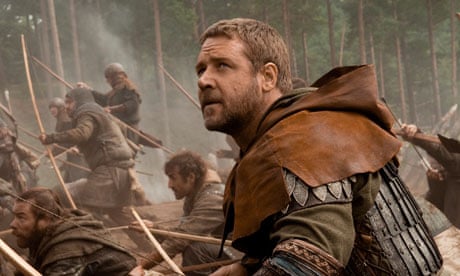"We are the boys of the hood …" says the scofflaw Robin, bow-and-arrow akimbo, as he relieves some toffee-nosed tyrants of a grain consignment rightfully belonging to the people and peasants of the Nottingham area, "… and we are merry at your expense!"
Actually, he's not all that merry. This is a pretty grim and gritty reinvention of the Robin Hood myth, with Russell Crowe beefily inhabiting the title role, but this tale of his beginnings is nonetheless an entertaining new fantasy, powerfully and robustly directed, with moments of Blackadderish silliness, tricked out with battle scenes, sieges, whistling arrow-showers, and high-political shenanigans at the court of King John, all of which distress and smoke-blacken the fantasy with a kind of authentic history-effect. Russell Crowe is very far from the easy-going impudence of Errol Flynn in The Adventures of Robin Hood (1938): there is no swordplay or swinging from chandeliers. He is much closer to the older, careworn hero portrayed by Sean Connery in Richard Lester's Robin and Marian (1976) – not, incidentally, that he is supposed to be old. Richard the Lionheart is casually described, albeit by his scapegrace brother John, as thoroughly ancient and past-it at the age of 40.
Apart from Gladiator, of course, the film Ridley Scott's new Robin Hood actually resembles is Christopher Nolan's Batman Begins, with the hero of Sherwood a misunderstood superhero of the shadows. His great enemy here is the evil nobleman Godefroy, played by Mark Strong, the corner of whose mouth gets cut by one of Robin's arrows, giving him a permanent lop-sided sneer – an idea clearly taken from Heath Ledger's Joker.
At the start of the tale, the protagonist is revealed to be called Robin Longstride, a fantastic name which must have taken screenwriter Brian Helgeland many hours of pacing to dream up. Short of calling him Robin Manlywalk, Robin Butchgait or Robin Notmincing, he could not have had a more macho handle. Robin is an expert bowman in the army of King Richard, played by Danny Huston, laying siege to a French castle. When the king passes among his troops asking for their honest opinion of him, Robin – that fearless, pugnacious fellow – looks his sovereign in the eye and declares that his army were "godless" in massacring Muslim civilians. And so the present-day uncool reputation of the Crusades is briskly acknowledged and dispatched: another break from the past. It never occurred to Errol Flynn to worry about Islamophobia.
For his honesty, Robin and some other golden-hearted rapscallions are placed in the stocks, but when Richard's army is routed and the King killed, they escape and witness pro-French traitors led by Godefroy ambushing some retreating British soldiers who are attempting to carry Richard's crown back to England. Robin and his crew ambush the ambushers and take the crown back themselves, with Robin passing himself off as the King's courtier and friend Sir Robert Loxley. Having handed over the crown to the slippery Prince John, played by Oscar Isaac in full Joaquin Phoenix mode, Robin gallops north to Nottingham on a mission to hand over the real Sir Robert's sword to his father, played by Max von Sydow, and here falls in love with Sir Robert's widow Marion (who makes no bones about not being a "Maid") played by Cate Blanchett with long, glistening locks and a feisty martial attitude – a combination of Elizabeth I and Rapunzel. Robin's charisma and natural leadership qualities are joyfully greeted by the locals, who are much oppressed by tax collectors, and the entire community gets substantially shitfaced on mead. Yet the invading French army, and the stormclouds of war, are approaching.
The main problem for any new film about Robin is how to handle the sheriff, because the danger is that he will effectively win the battle by upstaging Robin with all the funny lines and deliciously evil mannerisms.
Ridley Scott and Russell Crowe, like everyone else, will remember how Alan Rickman brutally squashed Kevin Costner in Robin Hood: Prince of Thieves (1991). Russell Crowe clearly had no intention of being straight man to some silvery British character actor, and this project was in its original form reportedly going to be about the sheriff, with Crowe in the role: a revisionist look at how the legendary baddie has been maybe misinterpreted. Evidently this audacious plan proved to be unsatisfactory, perhaps just too confusing, and so Crowe went over to the Robin role – the badass hero, rather than the goodass villain.
Evil character duties are effectively parcelled up among three figures: Prince John, Walter and the Sheriff of Nottingham himself, who is now a very shrunken and negligible figure, perhaps as a result of being discarded by the producer-star Crowe. Matthew Macfayden does his best with the part, and makes him a rather funny, cringing bully and coward, with a strangely gaunt, hollow-eyed look.
Finally, Robin is revealed to be no mere criminal but a revolutionary theorist and virtual inventor of the Magna Carta, as well as a lionhearted patriot and opposer of the French. He doesn't steal from the rich and give to the poor as such, but certainly demands that the people should have a say in creating the laws that bind them – not far from Sarah Palin and her Tea Party. It's an enjoyable romp and Ridley Scott makes it gallop along.

Comments (…)
Sign in or create your Guardian account to join the discussion